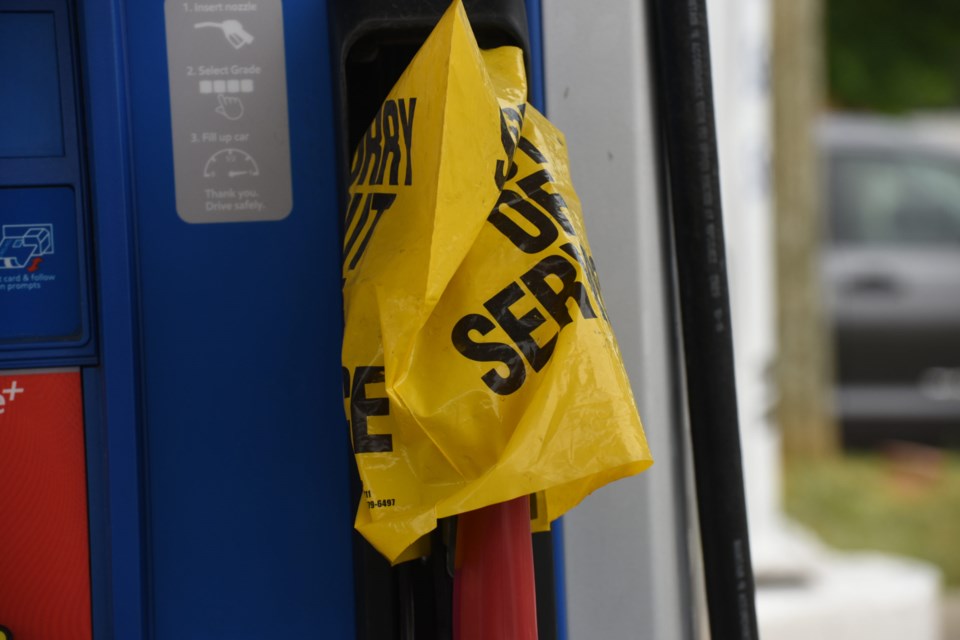There’s a lot of potential criticisms about the BC government’s response to the recent flooding disaster, but bringing in limits on gasoline in an attempt to ration our remaining supply should not be among them.
Solicitor General Mike Farnworth announced limits of 30 litres per gas station visit on the southwest coast until Dec. 1, in a bid to preserve the province’s existing supply for as long as possible. Essential vehicles, including ambulances, police, transit buses, grocery delivery, home-care workers, Canada Post, municipal vehicles and taxis, will get unrestricted access to gasoline via cardlock terminals to keep the supply chain and emergency services operational.
There’s no mystery behind the problem here, BC gets roughly 90 per cent of what becomes its consumer gasoline from Alberta via the TransMountain Pipeline. That pipeline was shut down during the flooding.
The federal government, which owns TransMountain, is making repairs to damaged sections with the hope of having it restarted within another week. But in the meantime, BC’s main source of fuel has, quite simply, run dry.
Farnworth said the province and fuel companies will look to barge in some supply from Washington State, Oregon and California, as well as bring in gasoline by rail whenever CN and CP can get BC’s tracks repaired and operational (also expected to be a week or so). Even if that happens, it will be minuscule compared to the amount lost by the TransMountain shutdown.
BC’s overreliance on a single pipeline for its gasoline and diesel has been a well-known problem for decades, most clearly spelled out by the BC Utilities Commission when it was asked by the BC government to investigate gas pricing in 2019.
“If the province had to replace refined products that are currently supplied by (TransMountain Pipeline), there is inadequate infrastructure in BC to transport, receive, store and distribute large quantities of refined fuels from any market other than Alberta,” read the report.
“This underlines the need to consider whether there is a need for further infrastructure development. Doing so could create flexibility and the ability to manage shortages should they occur.”
Well, here we are.
Shortages of gasoline are everywhere, with many stations on Vancouver Island and Vancouver going dry as refuelling trucks were delayed by blocked highways, and customers began lining up for hours to panic-buy whatever was left.
The government had no option other than to ration the remaining supply. It intends to instruct gas stations to automatically turn off the pump after every 30 litres, so no one can cheat and fill up their whole tank. It has put in place fines of up to $2,000 for people caught breaking the rules. And it has issued an order that prevents price gouging to protect customers from any unscrupulous sellers.
Some reaction has been, predictably, cynical.
What’s to stop someone from filling up 30 litres at one gas station, then driving down the road to another and doing it all over again?
Nothing, it appears - other than, hopefully, the shame that person must feel deep down inside for screwing over their friends, neighbours, and the emergency vehicles relying on that limited fuel during a crisis.
It’s not as if BC could have dispatched its already-beleaguered police departments to check people one by one at hundreds of gas stations on the south coast.
Nor could it have developed and implemented a system in time to track people’s gasoline intake in real time to ensure they aren’t station-jumping. The honour system was all that was really left.
“We can’t have a police officer at every gas station,” said Farnworth. “But what you can have are the good hardworking people of this province doing the right thing.”
In the weeks ahead, the province will face plenty of criticism over whether it adequately warned British Columbians about the serious risk of flooding in the early hours of the disaster, whether it was adequately prepared, whether it’s system of relying on local government responses is antiquated and whether it dropped the ball (again) by not using the Alert Ready emergency system to blast warning notices to people’s cell phones in the most dangerous areas.
All of that is fair game.
But a gasoline shortage caused by a natural disaster that shut down a federal pipeline is not the provincial government’s fault. Nor is the panic buying that has emptied pumps.
The solution, an automatic limit at the pump and an appeal to people’s conscience not to game the system for their own gain, is the best we can all hope for at this point.
Government, at its core, is simply a representative body of our society at large. But it can’t solve our problems if we undermine its solutions with poor behaviour. We either step up individually, or we don’t.
“If we pull together, we succeed,” said Farnworth. “If we’re greedy, we fail.”
We’ll see how it goes.
Rob Shaw has spent more than 13 years covering BC politics, now reporting for CHEK News and writing for The Orca. He is the co-author of the national best-selling book A Matter of Confidence, and a regular guest on CBC Radio.



